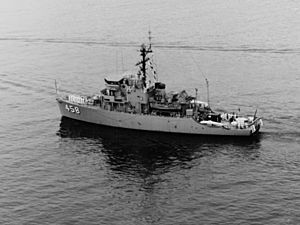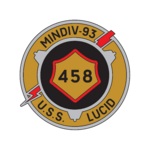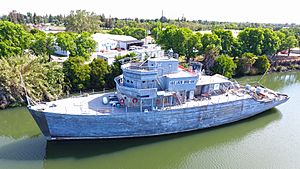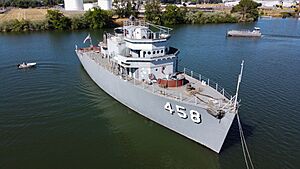USS Lucid (MSO-458) facts for kids

Lucid underway in the Pacific Ocean in February 1970
|
|
Quick facts for kids History |
|
|---|---|
| Name | Lucid |
| Namesake | bright, shining |
| Builder | Higgins Inc. Shipyard, New Orleans, Louisiana |
| Cost | $9 million |
| Laid down | 16 March 1953 |
| Launched | 14 November 1953 |
| Commissioned | 4 May 1955 |
| Decommissioned | 23 December 1970 |
| Stricken | 15 May 1976 |
| Homeport | Long Beach, California |
| Fate | Currently undergoing restoration as a museum ship in Stockton, California |
| Badge |  |
| General characteristics | |
| Class and type | Aggressive-class minesweeper |
| Displacement | 775 tons |
| Length | 172 ft (52 m) |
| Beam | 35 ft (11 m) |
| Draft | 10 ft (3.0 m) |
| Propulsion |
|
| Speed | 14 knots (26 km/h; 16 mph) |
| Complement | 6 officers 65 enlisted |
| Sensors and processing systems |
AN/SQQ-14 mine hunting sonar |
| Armament |
|
USS Lucid (AM-458/MSO-458) is a special type of ship called an Aggressive-class minesweeper. The U.S. Navy used her to find and remove naval mines. Mines are like underwater bombs that stop other ships from passing safely.
Lucid was built right after the Korean War. She sailed on five trips to the Western Pacific Ocean, known as WestPac cruises. She also served four times in Vietnam during the Vietnam War.
In 1970, after 15 years of service, Lucid was taken out of active duty. She was put into "mothballs," which means she was stored carefully. This happened because the Vietnam War was ending, and fewer minesweepers were needed.
Later, civilians bought Lucid. She was used as a houseboat for ten years. Then, she became a storage building for a scrap metal dealer. In 2005, a group called the "Save an MSO Foundation" got the ship. They wanted to save a ship of her kind to become a museum ship.
In 2011, Lucid moved to the Stockton Maritime Museum in Stockton, California. She is now being restored to her original look. Lucid is the last Aggressive-class minesweeper still floating in the United States.
Contents
Military Service
Building and Commissioning
The USS Lucid was the second warship to have this name in the United States Navy. Her construction began on March 16, 1953, at Higgins Inc. Shipyard in New Orleans, Louisiana.
She was officially launched into the water on November 14, 1953. On May 4, 1955, Lucid was officially put into service, or commissioned, with Lieutenant J. H. Graham in command.
Early Training and WestPac Cruises
After some initial training trips in the Caribbean, Lucid sailed to the Pacific Ocean. She arrived in Long Beach, California, on August 22. For the next year, she practiced mine warfare along the U.S. West Coast.
On October 1, 1956, she began her first trip to the western Pacific (WestPac). Between 1956 and 1963, Lucid completed four more WestPac cruises. During these trips, she worked with the U.S. 7th Fleet and took part in goodwill programs in different countries. When she wasn't on WestPac cruises, she practiced mine-clearing near southern California.
Supporting Operations in Vietnam
In 1964, Lucid continued her training exercises. On April 5, 1965, she left Long Beach for her fifth WestPac cruise. She arrived in the Philippine Islands in May and got ready for Operation Market Time. This operation involved patrolling the coast of Vietnam.
From June to October, Lucid patrolled and watched Vietnamese boat traffic. She stopped and checked 186 boats. This helped reduce the enemy's ability to bring in people and supplies by sea. Lucid returned to Long Beach in December and continued training until May 1966. Then, she went for repairs at a shipyard in San Pedro, Los Angeles.
Later Deployments and Decommissioning
After her repairs, Lucid left Long Beach again on January 6, 1967. She rejoined the Market Time forces, doing patrols and searching for mines in South Vietnam's harbors. She returned to Long Beach in November.
After more training, she sailed for WestPac again on April 1, 1968. She continued patrols off the Vietnamese coast and did mine-sweeping exercises with other navies. Lucid returned to Long Beach in mid-October and underwent major upgrades.
Lucid was officially taken out of service, or decommissioned, on December 23, 1970. She was then stored at the U.S. Naval Ship Repair Facility in Long Beach. In 1976, she was removed from the Navy's list of ships and sold.
Civilian Life and Restoration
From Houseboat to Storage
After being sold by the Navy, Lucid was turned into a houseboat. Several people lived on her for many years in different locations, including San Francisco and Oakland.
In 1986, the ship was given to William Gardner. He moved her to Bradford Island in the Sacramento–San Joaquin River Delta. Gardner removed valuable parts from the ship and used her as a storage building. He even cut a hole in the hull to make a door. In 2004, the scrap metal dealer passed away, leading to a change in the ship's ownership.
Saving a Piece of History
In 2005, William Gardner's widow donated Lucid to Mike Warren. Warren was a Navy veteran who had served on Lucid in the 1960s. For years, Warren and his "Save an MSO Foundation" had tried to save an Aggressive-class minesweeper to become a museum ship. The government usually did not donate wooden ships because they cost a lot to maintain.
Warren and a group of volunteers started the huge job of restoring Lucid. First, they removed tons of junk that had built up over the years. Then, they repaired the large hole in her side.
Becoming a Museum Ship
The Stockton Maritime Museum finally acquired Lucid. In November 2011, she was moved from Bradford Island to her new home in Stockton, California. She is now docked at a pier that used to be a Naval Reserve Center.
On March 15, 2012, USS Lucid was officially dedicated. This ceremony was held by the Stockton Maritime Museum and the San Joaquin Building Futures Academy. Students from the Academy and volunteers are currently working to restore the ship.
Once Lucid looks like she did originally, she is planned to be moved to the historic shipbuilding area near Weber Point in downtown Stockton. This area is important because many boats and ships were built there from the 1850s to the 1980s. Lucid will help honor Stockton’s shipbuilding history. She will also honor the people who worked there and those who served in the Navy on small ships like her.
Property has been obtained on the historic downtown Stockton waterfront. Plans have been submitted to build a replica shipyard structure and museum building. Meanwhile, restoration work on the ship continues.
Awards and Honors
Lucid received several important awards during her time in the Navy:
- National Defense Service Medal
- Vietnam Service Medal (with 4 stars, meaning she served in four different campaigns)
- Republic of Vietnam Meritorious Unit Citation (Gallantry Cross) (an award from Vietnam for brave actions by a unit)
- Republic of Vietnam Campaign Medal (another award from Vietnam for serving in the campaign)
Lucid also won the Battle Efficiency Award twice (1957-1961). This award is given to the best ship in each class. In 1963, she was recognized for having excellent food services. In 1968, Lucid earned the White "M" for being very good at minesweeping.
 | John T. Biggers |
 | Thomas Blackshear |
 | Mark Bradford |
 | Beverly Buchanan |



